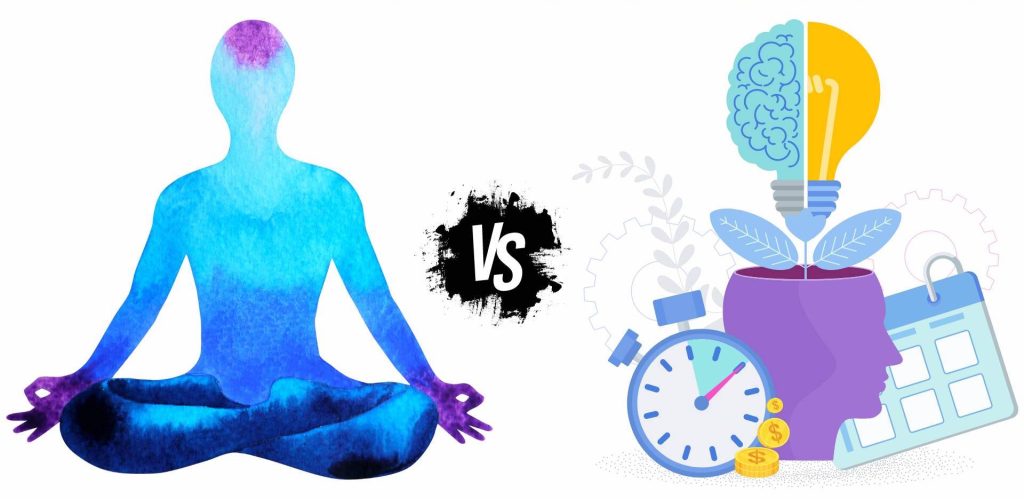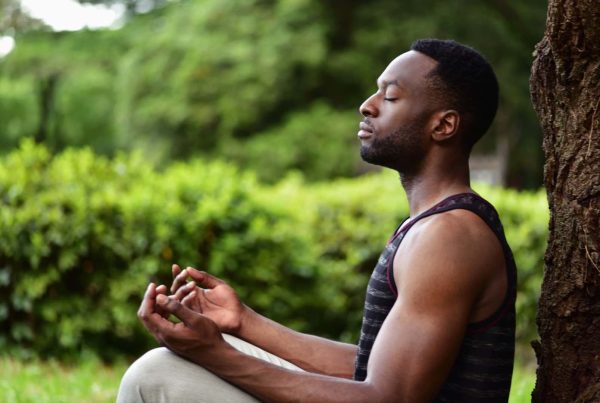I’ve been meditating for many years now, but I’ve been thinking my whole life. As have you. But what’s the difference between thinking and meditating? If you’re looking for an answer, then you’ve come to the right place.
Thinking and meditating are not the same. When you meditate you are not engaged in your thinking. That doesn’t mean your mind will be free from thoughts, they will arise. But when meditating, you learn to observe them passing by.
Meditation is like brain training that gives you a fresh perspective on your thoughts.
In this post, I’ll explore other common questions comparing the two. Plus, I’ll give you some effective techniques to get started on your meditation journey.
Let’s begin.
What’s the Difference Between Thinking and Meditating?

Thinking is a cognitive process that involves mental activity. Whereas during meditation you learn to be present and observe your thoughts, without engaging in them. In this sense, there is a big difference between the two.
Let’s examine this further.
When you think, you analyse and process information, problem-solve, and make decisions. You also introspect, generate ideas, create, and plan ahead.
The fact that we can think, remember, and plan for the future is incredible. We wouldn’t be where we are as a species today without this ability. But thinking can come at a cost. How?
Self-critical thoughts can shatter our confidence. Ruminating about the past makes us feel depressed. Constantly living in the future breeds anxiety. And overthinking can cause stress, worry, and fatigue.
Can you relate?
This is where meditation benefits you. It aims to quiet the mind. Creating a sense of stillness, peace, and presence. You do this by slowing down your breathing and focusing on it. This is your anchor. When your mind begins to wander, you observe your thoughts, then return to focusing on your breathing.
What’s the best way to learn to observe your thoughts? More on this later.
Is it Normal to Think While Meditating?
Don’t worry. It is normal to think when meditating. In fact, it’s impossible to stop thinking and empty your mind. Humans have a continuous flow of thoughts. Your mind is always active. Remembering, analysing, processing, and planning.
But it can feel exhausting at times, right?
Sometimes all we want to do is to switch off and be still, quiet, and calm.
I know this all too well because my mind used to rule my life. My expertise was in overthinking. I would worry about everything which caused me nothing but stress and anxiety. Mindfulness and meditation are what saved me.
When you meditate, you gain distance and perspective from that constant flow of thinking. You begin to understand that thoughts are only thoughts. They’re not facts. You don’t have to believe or allow them to consume you.
When you realise this, it’s LIBERATING. Your whole perspective and life can change.
This is what happened to me when I started meditating. My self-awareness expanded and developed. My mindset changed. Impulsive reactions, emotions, and negative habitual thinking no longer dominated my existence. I felt lighter, freer, and began to live a happier life.
It was a breath of fresh air.
Can You Control Your Thoughts with Meditation?
Meditation is not about controlling your thoughts. Our minds are impulsive, and our thinking is spontaneous. Just as you can’t stop thoughts from happening, you can’t control them.
Don’t let that disappoint you. We are all human, but our minds still act like chimps. At times people can be irrational and reactive. Thoughts happen in a split second. We make snap judgments when analysing our environment, situations, and people.
Why?
Well, we evolved that way to look out for danger. It’s how we’ve survived as a species all this time. This is what causes anxiety. If you perceive something to be threatening, in either the present moment or future, then your body prepares you.
You’ll go into a fight-flight-or-freeze mode.
In the past, predators and other tribes would have been our source of danger. Nowadays, it’s the fear of being fired, financial concerns, social media interactions, and so on.
So, thinking is not the enemy. Our brains evolved with our best interests at heart. But we need to keep our chimp-like minds in check. That’s why meditation is such a powerful tool. It empowers you to watch your thoughts.
Then you can whether to take them on board or let them pass on by. In this sense, you can at least prevent your thoughts from controlling you.
How can you do this? Let’s look at that next.
“The goal is to be the observer of your thoughts and not let your thoughts control you.”
— Deppak Chopra
How Can You Observe Your Thoughts with Mediation?

This is a skill that takes time to develop. At first, it feels like you are your thoughts. Most people identify with them, so it seems impossible to gain perspective. But as you begin to cultivate more self-awareness, you soon realise that you are the observer.
Your thoughts just come and go in and out of your awareness. Using imagery is helpful to recognise this, especially for beginners.
Imagine that your thoughts are like clouds passing in the vast blue sky, or leaves floating down a stream. Perhaps you like to think of them as unwanted visitors knocking on your door, or waves dispersing into the open ocean.
There are a lot of imagery techniques to try but as this is a bigger topic, I encourage you to read my article How to Observe Your Thoughts with Meditation. Here I provide many detailed examples you can use to gain perspective over your pesky thoughts.
Feel free to browse through it.
The moment you start watching your thoughts, a higher level of consciousness becomes activated.”
— Eckhart Tolle
Use Your Mind Like a Tool
Now you know the difference between thinking and meditating What you do with that information is up to you. If this article has got you saying, “I do need to learn to let my thoughts rule me less.” Then that’s great. I’ve inspired you to take positive action.
Learn to use mindfulness and meditation for your own benefit.
I’ve given you some suggestions for how to get started, so what are you waiting for? Develop your self-awareness. Change your perspective. Take back the reins of your mind and use it like a tool. When you do, you’ll unleash your full potential.
How exciting!
Do you have any questions or comments? I’d love to hear them below.
Take care of yourselves,
Chris from Mindful Way to Be



